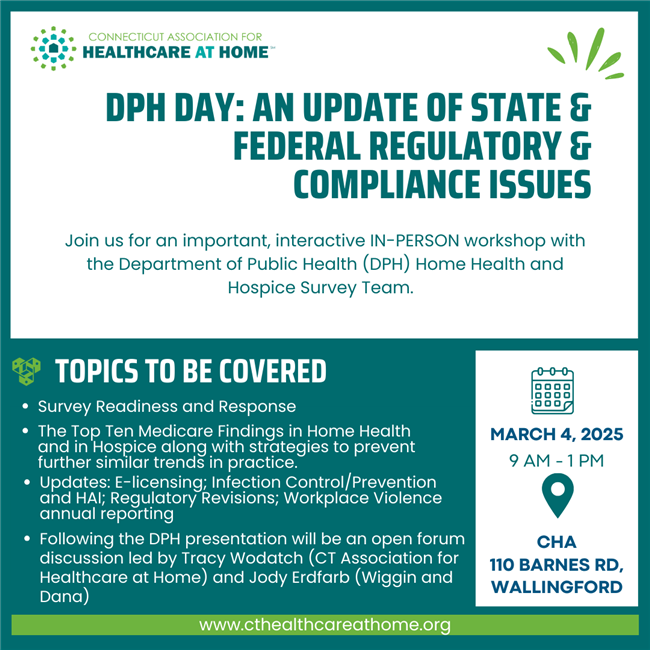 |
|||||||||||||||||||||||
| January 23, 2025 | |||||||||||||||||||||||
Source: Alliance Daily, January 17, 2025
On January 16, 2025, the Medicare Payment Advisory Commission (MedPAC) convened to finalize its recommendations on Medicare payment adequacy for various service lines, including home health and hospice services. The Commission’s decisions focused on payment adequacy, access to care, quality, financial performance, and projections for 2025 and beyond. This follows a December 2024 session in which MedPAC provided draft recommendations for, among other provider types, home health and hospice services. See our Alliance Daily article covering MedPAC’s December session. Note that MedPAC is an advisory body that makes recommendations to Congress. Even with a unanimous vote in favor of any recommendation, Congress must adopt the necessary legislative changes to implement these recommendations. The National Alliance for Care at Home (Alliance) has serious concerns over the potential negative impact these recommendations would have on care access and quality and will continue to strongly advocate for payments that ensure the sustainable delivery of high-quality care in the home. Source: Alliance Daily, January 16, 2025
The Research Institute for Home Care (RIHC or the Institute) and the National Alliance for Care at Home (the Alliance) are excited to announce the release of the 2024 RIHC Home Health Chartbook and the 2024 Hospice Care Chartbook. Highlighting the vital role home health and hospice play in caring for an aging demographic, both Chartbooks provide a look at the patients being served in home health and hospice, who they are demographically and clinically, and more.
Published annually, the Home Health Chartbook provides a broad overview of home health patients, the home health workforce, organizational trends, and the economic contribution of agencies, as well as data on 30-day rehospitalization rates. Compiled and charted by KNG Health Consulting, the Chartbooks summarize and analyze statistics on home health from a range of government sources, including the Medicare Current Beneficiary Survey, Bureau of Labor Statistics, the U.S. Department of Commerce, Medicare Cost Reports, Home Health Compare, Medicare fee-for-service claims, and other data from the Centers for Medicare & Medicaid Services. Source: Alliance Daily, January 17, 2025
(Alexandria VA, and Washington, DC) – The Board of Directors of the Partnership for Quality Home Healthcare (PQHH) plans to cease operations of the organization effective March 1, 2025. Moving forward, the PQHH Board of Directors will combine efforts with the National Alliance for Care at Home (the Alliance). By establishing a unified and robust industry voice through the Alliance, the PQHH Board of Directors hopes to advance the public policy and regulatory issues affecting the home health community’s shared vision of a healthcare system that fully recognizes the essential role of home health in delivering compassionate and value-driven care. “We have the deepest gratitude for all who have served this organization and championed PQHH’s mission, especially our Chief Executive Officer Joanne Cunningham, who has expertly managed and successfully driven PQHH’s agenda and advocacy for nearly 7 years,” said David Baiada, PQHH Chairman. “Joanne’s commitment to this sector and expertise in planning and executing federal advocacy is unmatched in the home health community and will continue to have a positive, lasting impact on our industry and our patients.” State associations & more filed a lawsuit in Texas claiming reform efforts will harm patients & providers
Source: HomeCareNews, January 16, 2025 HOUSTON–Hospice providers and several state associations filed a lawsuit Thursday, Jan. 16, against the Department of Health and Human Services (HHS) to block the implementation of the Special Focus Program (SFP). The group, which includes state associations from Texas, Indiana, North Carolina, South Carolina and Houston Hospice, said the publication of a list of “poor performing” hospice providers “is so arbitrary and flawed that it will make it harder for patients and families to find trustworthy providers,” the lawsuit read. Source: Assistant Secretary for Planning and Evaluation: Office of Behavioral Health, Disability, and Aging Policy, January 10, 2025
Key Points:
|
|||||||||||||||||||||||
| Past Issues | Subscribe | cthealthcareathome.org | Advertise with Us | |||||||||||||||||||||||




